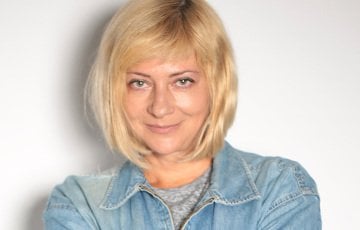The Independent: In Europe's last dictatorship, all opposition is mercilessly crushed
38- By Jerome Taylor, The Independent
- 9.03.2011, 2:22

The KGB headquarters in the centre of Minsk is known to locals as "Amerikanka".
No one is really sure how the sprawling complex got its name, but everyone in Belarus knows it is not a place you want to end up.
With its Corinthian columns and bright yellow walls, the building looks harmless from the outside. But it is in fact a cage for Europe's last prisoners of conscience and the epicentre of a brutal crackdown carried out by the continent's last dictator.
As the Middle East burns with popular anger over the region's lack of democratic progress it is easy to forget that one corner of Europe still steadfastly refuses to abandon its dictatorial past.
Alexander Lukashenko, the president of Belarus, has ruled his country with an iron fist ever since the republic achieved independence from the Soviet Union in 1994. But over the past two months his security forces have gone after his opponents with a ferocity that would not have looked out of place in Soviet times.
Virtually all the presidential candidates who dared to stand against Mr Lukashenko in last December's flawed elections have been imprisoned or placed under house arrest. Multiple allegations of torture have been made, while candidates have been pressured to denounce each other in video statements.
Some have buckled, but most have refused and are facing the possibility of years in prison for daring to take part in elections. Five lawyers who have represented prisoners have been struck off while a further 700 ordinary citizens have also been arrested in what Human Rights Watch has described as a "mockery of justice". And the show trials – in a country where the secret police are still called the KGB – have only just begun.
Last week Alexander Otroshchenkov, a press officer for a prominent opposition politician, was led into a courtroom cage and handed a four-year jail sentence in a maximum security prison after a trial which lasted just hours.
Prosecutors accused Mr Otroshchenkov and two others of committing vandalism during a mass protest in Minsk on the night of the presidential elections. The vast majority of the protest was peaceful but a small number of activists – some allege they were agent provocateurs – began attacking a government building on Minsk's Independence Square, giving the riot police a pretext to crush the protest.
The 30-year-old admitted being at the protest, which was attended by an estimated 30,000 people, but he denied causing any damage. The so-called "act of vandalism" that brought Mr Otroshchenkov four years in jail was "hitting a wooden barrier".
Over the coming days and weeks the trials will continue. A further 18 people, including seven presidential candidates who ran against Mr Lukashenko, are facing charges of organising a mass riot – a crime which can carry up to 15 years in jail.
Ales Mikhalevich is one of them. For two months the lawyer-turned-opposition politician languished in Amerikanka after KGB agents kicked down his door and arrested him the day after the election protests in Minsk. The 35-year-old father of two was released on 19 February, but only after he had signed a statement saying he would co-operate with the KGB and tell nobody about what had happened to him.
But last week Mr Mikhalevich did something remarkable. On Monday he managed to slip away from his minders and travel to a press conference where, in front of a troupe of reporters, he tore up the piece of paper he had signed with the KGB and proceeded to give a detailed account of the torture that he and his fellow inmates claim to have been subjected to.
"I realise that even before this day is out I could find myself back in the KGB detention centre cell," he said. "I will do all that I can to make this concentration camp in the centre of Minsk disappear forever."
Speaking to The Independent by telephone, Mr Mikhalevich called on Europe to "show solidarity" with those democracy activists in Belarus who had chosen to speak out. "We need to get the message out there," he said. "I told the truth. They didn't expect me to do that. I think they expected me to stay quiet about torture in this KGB centre. They don't like it when things come out into the open. It's not their method. They like to do things on the quiet and away from the public."
Andrei Sannikov has been kept hidden from the public for 10 weeks. He is one of two presidential candidates still being held incommunicado inside Amerikanka (the other is Nikolai Statkevich). Mr Sannikov, a 57-year-old former diplomat, is one of the most prominent opposition leaders to have been arrested during the 19 December protests and was beaten by riot police as they retook the square. His wife, the investigative journalist Irina Khalip, is under house arrest and there are two KGB agents stationed in her flat.
"For weeks we had no idea where Andrei was," explained his sister, Irina Bogdanova, who came to Britain in the 1990s and settled in Hampshire. "The conditions he is being kept in are appalling. The cell temperature is kept at between eight and 10 degrees and he has only seen his lawyer during interrogations."

Photo: SUSANNAH IRELAND
Irina Bogdanova, left, with a picture of her brother, Andrei Sannikov, and Danielle, daughter of Natalia Koliada
Vladimir Neklyaev wasn't even in Independence Square when he and his followers were set upon by riot police. The presidential candidate was travelling with a sound system towards the square when they were charged by policemen in black leather jackets, according to witnesses. Mr Neklyaev was severely beaten and taken to hospital, but not even his injuries stopped him from being arrested. The 64-year-old poet was bundled out of his hospital bed in a blanket by KGB agents and taken to Amerikanka.
"The men showed no identification," his daughter Eva Neklyaev said in a phone call from Finland. "They didn't even say he was being arrested. They just carried him out in a blanket. It was eight days before we received any information about where he had been taken."
Now under house arrest, his family and human rights groups say Mr Neklyaev has been refused access to medical treatment for blood pressure problems and is a prisoner in his own home.
Heather McGill, Amnesty International's researcher on Europe and Central Asia, said: "The political repression in Belarus is some of the worst we have seen for years. But the real tragedy is, what we are seeing in terms of treatment of detainees is nothing unusual. Despite being in the heart of Europe, torture in Belarus is still commonplace."
In a recent interview, Mr Lukashenko blamed Europe and the US for deliberately stirring up trouble.
Many of those who were arrested and later released over the past two months have since left the country. Natalia Koliada works with the Free Belarus Theatre, a troupe of artists who take enormous risks to stage uncensored performances in underground theatres. She was imprisoned during the protests in Independence Square but later released on a technicality. Her family waited until the stroke of midnight on New Year's Eve to cross the border into Russia, slipping past the drunken border guards.
"It was a terrifying journey," said Ms Koliada's 12-year-old daughter Dana, who has since made it to Britain. "Now, whenever we call our family back home, they say that the KGB have been looking for us."
Urging Europe and Britain to take a stronger stance towards Belarus, Ms Koliada said: "Minsk is just a two-hour flight from London. The UK Government needs to give some sort of sign to the people of Belarus that they are not alone. We don't have gas, we don't have oil, we don't have anything of geopolitical interest for countries like Britain. But we do have people. Please don't wait for those people to be killed in the streets."
Lawyers working on behalf of Free Belarus Now, a campaign group that supports victims of the Lukashenko regime, are currently building up a dossier of evidence and allegations to present to the UN in the hopes of persuading the Security Council to act on the human rights violations.
Jason McCue, of the law firm H2O Law, said: "The people of Belarus have a right to a free and fair government and to be safe from threats, harassment, intimidation and torture for their political beliefs.










